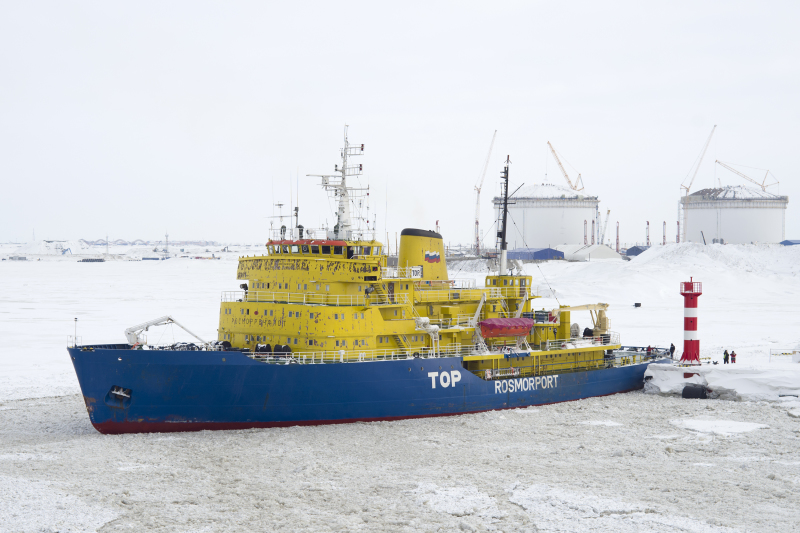 India-Russia
India-Russia
India wins contract over China to construct four non-nuclear icebreaker ships for Russia
New Delhi/IBNS: In a significant geopolitical and economic development, India has outpaced China to secure a contract to build four non-nuclear icebreaker ships for Russia.
This victory underscores India's growing maritime engineering prowess, as well as the deepening ties between Moscow and New Delhi.
It also highlights the shifting dynamics in global trade, energy, and regional cooperation, particularly in the Arctic.
Icebreakers are crucial to operating in the Arctic region, where thick ice sheets hinder navigation.
As global warming opens new trade routes through the Arctic, the demand for ice-capable vessels has surged.
These ships will allow Russia to maintain and expand its Arctic presence, enabling year-round navigation along the Northern Sea Route (NSR), a key shipping lane connecting Europe and Asia.
Russia, which controls much of the NSR, has been keen to develop its Arctic infrastructure to capitalize on the shorter trade routes and unlock vast untapped natural resources, including oil, gas, and minerals.
In this context, these four icebreakers will play a pivotal role in supporting Moscow's ambitions for greater economic exploitation of the Arctic.
India winning this contract marks a significant milestone for its shipbuilding industry, particularly in specialized sectors such as icebreakers.
Traditionally, shipbuilding in India has focused on domestic defense needs, commercial vessels, and maintenance.
However, over the past decade, the country has steadily advanced its shipbuilding technology, expanding its capabilities to include highly specialized vessels like icebreakers.
With this contract, Indian shipyards—most likely Cochin Shipyard or Mazagon Dock Shipbuilders—are expected to leverage modern technologies and build these vessels to withstand the challenging Arctic conditions.
India’s ability to execute this contract will bolster its reputation as a global player in shipbuilding and specialized maritime engineering.
The contract is not just a commercial win but also a diplomatic triumph for India, signaling stronger Russia-India ties.
Russia, a traditional ally of India since the Cold War, continues to rely on Indian support for a range of defense and infrastructure projects.
With the Western sanctions imposed on Russia following its conflict with Ukraine, Moscow has increasingly turned to non-Western countries like India and China for strategic partnerships and trade.
China, which also bid for the contract, has been an aggressive player in the Arctic with its own ambitions to establish a presence in the region through its "Polar Silk Road" initiative.
Winning this contract over China signifies that Russia values India's maritime capabilities and longstanding relationship more, despite the close economic ties between Moscow and Beijing.
It also sends a clear signal about the strategic nature of the Russia-India relationship, as it evolves in response to current global realignments.
For India, this contract aligns with its broader foreign policy goals.
Although it is not an Arctic state, India is an observer in the Arctic Council and has expressed interest in contributing to the region's scientific and commercial activities.
By building these icebreakers, India not only strengthens its ties with Russia but also positions itself as a stakeholder in the Arctic’s future development.
Apart from the geopolitical significance, the contract is expected to bring substantial economic benefits to India’s shipbuilding sector.
The project will likely involve extensive collaboration with Russian companies for technology transfer, design, and material sourcing.
This partnership could open the door to more complex shipbuilding projects in the future, not only with Russia but with other countries seeking specialized maritime vessels.
India’s workforce will gain from the high-skill jobs generated by the project, from naval architects to engineers and shipbuilders.
Additionally, the project is expected to boost India's expertise in Arctic-class ships, an area that very few countries have mastered.
Support Our Journalism
We cannot do without you.. your contribution supports unbiased journalism
IBNS is not driven by any ism- not wokeism, not racism, not skewed secularism, not hyper right-wing or left liberal ideals, nor by any hardline religious beliefs or hyper nationalism. We want to serve you good old objective news, as they are. We do not judge or preach. We let people decide for themselves. We only try to present factual and well-sourced news.







